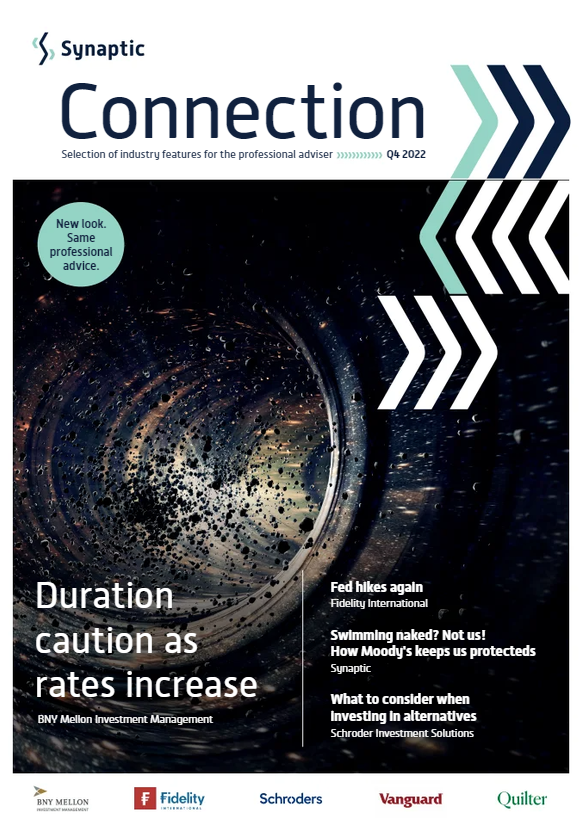In this edition...
- Ignore the Noise and Stick to the Strategy Eric Armstrong, Client Director, Synaptic
- Fed hikes again, but are we passed peak hawkishness? Salman Ahmed, Global Head of Macro and Strategic Asset Allocation, Fidelity International
- Duration caution as rates increase Paul Flood, Head of Mixed Assets Investment Newton Investment Management, part of BNY Mellon Investment Management
- Why investors shouldn’t overreact to talk of a recession Shaan Raithatha, Senior Economist - Vanguard, Europe
- What should I consider when investing in Alternatives in my multi-asset portfolio? Alex Funk, CIO Schroder, Investment Solutions
- Has the world changed? Mark Harris, Portfolio Manager, EPIC Investment Partners
- Swimming naked? Not us. Moody’s keeps us well protected. Eric Armstrong, Client Director, Synaptic
- The high-carbon transition Natasha Landell-Mills, Head of Stewardship, Sarasin & Partners
- Twitter, tech stocks & the untapped monetary potential Richard O’Sullivan, Investment Research Manager, RSMR
- GPUs are driving the future of computing Hamish Chamberlayne, Head of Global, Sustainable Equities
- Impact investing doesn’t mean compromising on returns M&G Investments,
- Quilter: Integrating responsible investment into your advice process Andy Miller, Investment Director Lead, Quilter
- Being green is in fashion Rahab Paracha, Sustainable multi-asset investment specialist, Rathbones
- Growth Investing: why the hunt for outliers remains compelling Stuart Dunbar, Partner, Baillie Gifford & Co
- Freedoms revisited - Where do we go from here? Matt Ward, Communications Director, AKG

Hamish Chamberlayne, Head of Global Sustainable Equities, and Richard Clode, technology equities portfolio manager at Janus Henderson Investors, discuss how the tiny graphics chip is playing a huge role within the global digital transformation.
Graphics processing units (GPUs) are engines for the future of computing. Designed for parallel processing, a GPU is a specialised electronic circuit card that works alongside the brain of the computer to enhance the performance of computing. If you are reading this article on an electronic device, a GPU is likely powering your screen display.
The power of parallelism: applications in AI and deep learning
While GPUs were initially used in computer graphics and image processing, the use case has significantly broadened as technology has evolved. Moore’s Law – the observation that the number of transistors in an integrated circuit doubles every two years while the cost of computing halves – has made GPUs cheaper and more readily available.
Artificial intelligence (AI) and deep learning models, which require intense parallel processing of thousands of neural networks simultaneously, also rely on GPUs. The application of deep learning is broad, from enabling web services to improving autonomous vehicles and medical research. This technology will form the basis of the next generation of computing platforms as businesses begin their digital transformations.
Digitalisation driving decarbonisation
We believe that digitalisation plays a positive role in economic development and social empowerment, and we also see a close alignment between digitalisation and decarbonisation. Digitalisation ‘cracks’ open the shell of traditionally analog functions, promoting data transparency and enabling businesses and individuals to make wellinformed decisions about consumption, production and reduction based on current behaviours.
We have already begun to see digitalisation penetrate and advance traditional practices – manufacturers integrate technology into industrial processes to optimise production, building managers use smart technology and data analytics to ensure energy is consumed only when necessary, and intelligent transportation systems analyse traffic data to reduce congestion, fuel use and emissions.
Does powering technology come at a cost?
One of the critical challenges with a global digital transformation is the significant energy needed for high-performance computing. It is important for us to understand the true energy cost demanded from technology, and what can be done to lower overall energy consumption. There is a misconception that an increase in data centre usage equates to increased energy demand. According to the International Energy Agency (IEA), data centre energy use has remained flat despite an explosion of data centre demand and internet traffic – chart 1. This disparity is driven by efficient systems and processes. For AI applications, some GPUs can be up to 42 times more energy-efficient than traditional CPUs. Meanwhile, some hyperscale GPU-based data centres use only 2% of the rack space, making them more space-efficient compared to CPU-based systems.1 In short, GPUs pack a punch. By enabling smarter use of energy, they contribute in part to keeping energy use to a minimum.

The path to net zero
While GPUs can optimise energy, they do not run without emitting carbon. Like all industries, technology will have to do its part to achieve net-zero emissions. In 2021, the International Energy Agency (IEA) reported “more efforts needed” in the data centres and data transmission sector to reach net zero.3 We believe a focus on ongoing efficiency improvements in data centre infrastructure is integral to meeting these goals, reinforcing the role that GPUs play in creating a sustainably digitalised world.
Conclusion
Digitalisation is the cornerstone of our future. From humble beginnings, the GPU has evolved into one of the most critical facilitators of innovation and digital transformation for society. We also believe that the next generation of computing is essential to achieving global sustainability goals. When analysing individual companies, we believe that shifting to a low-carbon business model is a marker for long-term success, and we look to technology to enable this change.
For more information, please visit www.janushenderson.com or email emeasalessupport@janushenderson.com
Important Information:
The views presented are as of the date published. They are for information purposes only and should not be used or construed as investment, legal or tax advice or as an offer to sell, a solicitation of an offer to buy, or a recommendation to buy, sell or hold any security, investment strategy or market sector. Nothing in this material shall be deemed to be a direct or indirect provision of investment management services specific to any client requirements. Opinions and examples are meant as an illustration of broader themes, are not an indication of trading intent, are subject to change and may not reflect the views of others in the organization. It is not intended to indicate or imply that any illustration/example mentioned is now or was ever held in any portfolio. No forecasts can be guaranteed and there is no guarantee that the information supplied is complete or timely, nor are there any warranties with regard to the results obtained from its use. Janus Henderson Investors is the source of data unless otherwise indicated, and has reasonable belief to rely on information and data sourced from third parties. Past performance does not predict future returns. Investing involves risk, including the possible loss of principal and fluctuation of value.
Not all products or services are available in all jurisdictions. This material or information contained in it may be restricted by law, may not be reproduced or referred to without express written permission or used in any jurisdiction or circumstance in which its use would be unlawful. Janus Henderson is not responsible for any unlawful distribution of this material to any third parties, in whole or in part. The contents of this material have not been approved or endorsed by any regulatory agency.
Janus Henderson Investors is the name under which investment products and services are provided by the entities identified in Europe by Janus Henderson Investors International Limited (reg no. 3594615), Janus Henderson Investors UK Limited (reg. no. 906355), Janus Henderson Fund Management UK Limited (reg. no. 2678531), Henderson Equity Partners Limited (reg. no.2606646), (each registered in England and Wales at 201 Bishopsgate, London EC2M 3AE and regulated by the Financial Conduct Authority) and Janus Henderson Investors Europe S.A. (reg no. B22848 at 2 Rue de Bitbourg, L-1273, Luxembourg and regulated by the Commission de Surveillance du Secteur Financier).
Outside of the U.S.: For use only by institutional, professional, qualified and sophisticated investors, qualified distributors, wholesale investors and wholesale clients as defined by the applicable jurisdiction. Not for public viewing or distribution. Marketing Communication.
Janus Henderson, Knowledge Shared and Knowledge Labs are trademarks of Janus Henderson Group plc or one of its subsidiaries. © Janus Henderson Group plc.
Footnotes
1 Nvidia, Corporate Social Responsibility Report, 2021 2 https://www.iea.org/data-and-statistics/charts/global-trends-in-internet-traffic-data-centres-workloads-and-data-centre-energy-use-2010-2020 3 International Energy Agency, Tracking Clean Energy Progress Report, 2022
Sign up for updates
Keep up to speed with everything you need to know each quarter, by email or post.


